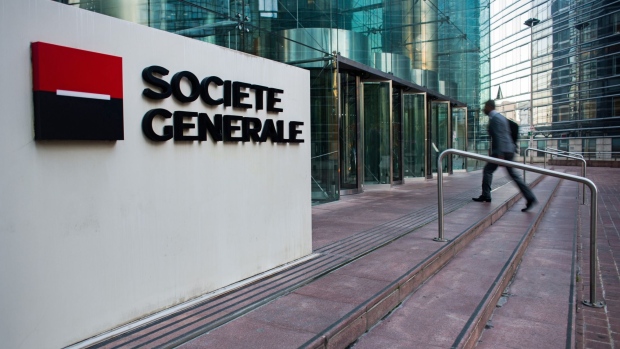Nov 4, 2022
Societe Generale Beats Estimates as Traders Post Bumper Quarter
, Bloomberg News

(Bloomberg) -- Societe Generale SA posted a surge in debt trading in the third quarter and eked out a gain in equities where peers struggled, helping drive net income almost 50% higher than analyst estimates.
The Paris-based bank’s fixed-income and currencies trading revenue jumped 34% in the three months through September, beating the result posted by rival BNP Paribas SA and 23% average gain across major Wall Street banks. An unexpected 1% increase in equities trading helped propel net income to €1.5 billion, compared with estimates of just over €1 billion.
SocGen shares jumped as much as 5.4% at the start of trading in Paris, paring losses this year to 18%.
For the European banking sector, gains in debt trading and lending revenue last quarter helped offset declines in trading stocks and dealmaking. Aided by sharp interest-rate increases by central banks, Deutsche Bank Group AG said it delivered its best profits in more than a decade, while UniCredit SpA bucked recession fears by raising its outlook.
The third quarter was “marked by increasing revenues, continued control of operating expenses and a contained cost of risk, while maintaining a prudent provisioning policy,” SocGen Chief Executive Officer Frederic Oudea said in a statement.
The bank is in the middle of a leadership transition, with Oudea set to be replaced by Slawomir Krupa next year. The lender, which faced a multibillion-euro hit earlier this year after its exit from Russia, in August outlined new revenue targets and pledged higher profitability as rising interest rates and a global trading rally boost revenue.
Read More: SocGen Picks Investment Bank Head Krupa as Next Chief Executive
The lender is also merging its domestic networks Societe Generale and Credit du Nord, a strategic shift that involves thousands of job cuts. The bank confirmed that the legal completion will take place on Jan 1.
The appointment of investment-bank chief Krupa is expected to set in train a broader management reshuffle as the 15-year reign of Oudea ends with high-profile departures. Late Thursday, the lender said it appointed Stephane Landon as Chief Risk Officer to replace departing Sadia Ricke.
In parallel with peers, SocGen has reaped the benefits of central banks’ rates increases with higher revenue stemming from its lending operations. The lender’s international retail unit saw its revenue rise 6%. However, revenue at its retail networks in France, where fixed-rate mortgages make it harder for banks to get an immediate boost from higher rates, only increased 0.5%.
Equities Beat
SocGen’s historically key equities trading desk saw its revenue rise to €806 million, higher than analysts expected. Its performance outstripped the 13% average decline across major Wall Street major banks.
The bank’s smaller fixed income trading unit saw its revenue rise to €538 million euros, as volatility spurred by rising interest rates boosted the performance across the sector in the third quarter. The performance at the bond trading unit came in just behind Deutsche Bank’s 38% jump.
Oudea, who upgraded trading guidance earlier this year, was also optimistic for the bank’s 2022 performance.
“It’s fair to say this year will be very strong, with the benefit of very strong commercial activities on both equities and fixed income” he said in an interview with Bloomberg TV on Friday.
The lender said it expects the underlying cost to income ratio to be below 64% for 2022, having previously forecast it at between 64% and 66%. The bank set aside €456 million to cover potentially souring loans, lower than analyst estimates.
The relatively modest provisioning is in line with regional peers, which have adopted a sanguine outlook despite the looming economic recession and risks related to the war in Ukraine. That’s gained the attention of regulators, who have argued for restraint in bonuses and investor payouts.
SocGen’s range of economic scenarios for 2023 includes a possible 2% to 3% recession in the Euro area, Oudea said. The lender’s central scenario sees EU rates going down from late 2023 to early 2024, he said.
Read More: ECB Says European Banks Are Too Optimistic About Macro Risks
SocGen’s fully-loaded CET1 ratio, a key measure of financial strength stood at 12.9%, in line with estimates.
--With assistance from Caroline Connan.
(Updates with share reaction in third paragraph)
©2022 Bloomberg L.P.


